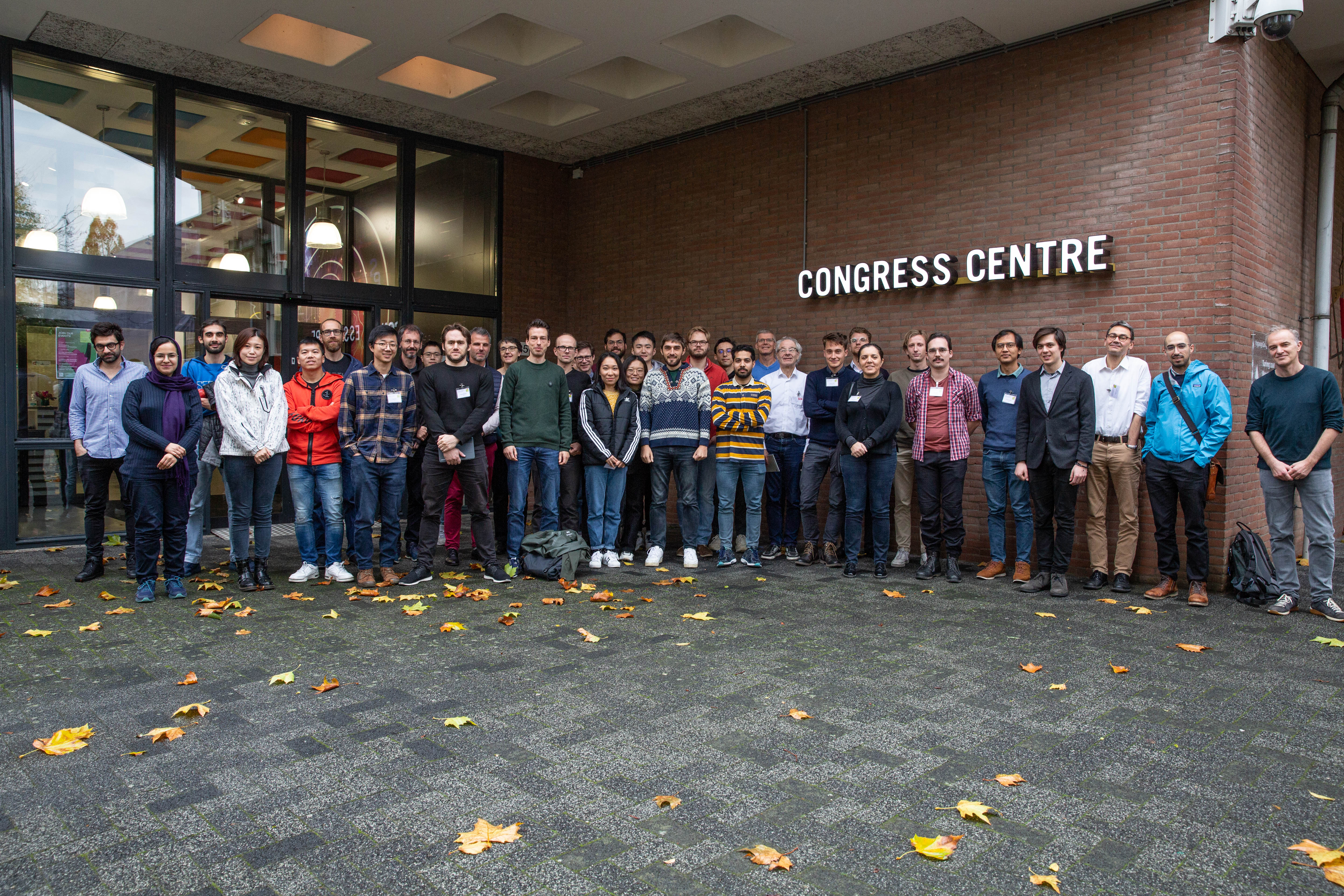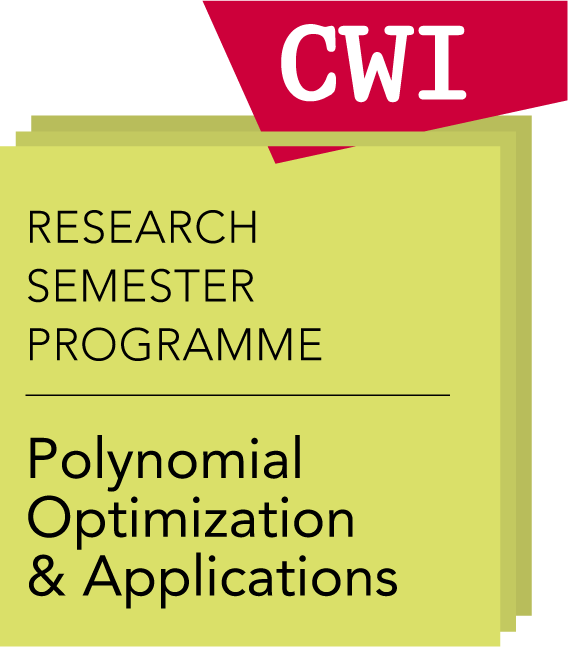Workshop on Polynomial Optimization and Applications in Control and Energy
CWI, Amsterdam
17-18 November, 2022
This workshop is devoted to the application of polynomial optimization methods in the analysis and control of dynamical systems and energy networks. The polynomial optimization approach offers a powerful framework to model hard nonconvex, nonlinear control problems as infinite-dimensional linear optimization problems over measure spaces. The rich interplay between functional analysis and operator theory, and real algebraic geometry, underlies the nowadays well-known moment/sum-of-squares hierarchy of relaxations, that allows to efficiently obtain converging sequences of bounds. This approach has also been recently developed to attack optimal power flow problems in large electrical networks. The program will feature lectures by experts in the field. It will start with some introductory lectures and ample time will be left for discussions.
You may download the program of the workshop here.
Program of the workshop
Thursday 17 November
09:30-10:30 Didier Henrion
10:30-11:00 break
11:00-12:00 Milan Korda
12:00-13:30 Lunch
13:30-14:30 Matteo Tacchi
14:30-14:45 Break
14:45-15:45 Claudio de Persis
15:45-16:00 Break
16:00-17:00 Amir Ali Ahmadi
17:00-18:30 Reception
Friday 18 November
09:30-10:30 John Simpson-Porco
10:30-11:00 Break
11:00-12:00 Sergio Grammatico
12:00-13:30 Lunch
13:30-14:30 Claudia d'Ambrosio
14:30-15:00 Break
15:00-16:00 Matthias Staudigl
16:00-17:00 Discussions and closing
Speakers and Lectures
The list of invited speakers includes (in alphabetic order):
- Amir Ali Ahmadi (Princeton University)
Title: Learning dynamical systems with side information or safety constraints
Slides.
Abstract:
We present conic optimization-based algorithms for learning a dynamical system from limited trajectory data and subject to `side information' or `safety constraints'. Side information represents contextual knowledge about the system and is inferred from domain-specific expertise or principles of a scientific discipline. In the first half of the talk, we show how sum of squares optimization can exploit side information to learn more accurate models when data is limited. Safety constraints, which arise e.g. in safety-critical control and robotics applications, restrict the set of allowable queries to the unknown dynamical system to those whose future trajectories are guaranteed to remain in a given (safe) set. In the second half of this talk, we show that linear, second-order cone, and semidefinite programs can succeed in safely learning dynamical systems in certain natural settings. Joint work with Bachir El Khadir (first half), and with Abraar Chaudhry, Vikas Sindhwani, and Stephen Tu (second half).
- Claudia d'Ambrosio (LIX Paris)
Title: On separable polynomial optimization and its applications
Slides.
Abstract:
In this talk, we focus on separable polynomial optimization problems. Separability is a property that could be exploited in several ways, from devising effective algorithms for global optimization to identifying strong underestimators. Finally, we overview applications concerning the approximation of complex functions through separable polynomial optimization.
- Sergio Grammatico (TU Delft, Delft Center for Systems and Control)
Title:
Generalized Nash equilibrium seeking
Slides.
Abstract:
Generalized Nash equilibrium seeking problems arise in several application domains, e.g. in energy systems and automated driving, where autonomous agents aim at optimizing their individual objective functions subject to operational constraints and limited information. In this talk, we review the available theory and computational methods for generalized Nash equilibrium seeking and discuss recent research directions.
- Didier Henrion (LAAS-CNRS Toulouse, and Czech Technical University, Prague)
Title: The moment-SOS hierarchy for polynomial optimization and volume
approximation
Slides.
Abstract:
In this tutorial talk, we first explain the basic principles
of the moment-SOS hierarchy for solving polynomial optimization
problems. Then, we describe how it can be adapted to the problem of
approximating the volume of semialgebraic sets.
- Milan Korda (LAAS-CNRS Toulouse, and Czech Technical University, Prague)
Title: The moment sum-of-squares hierarchy in dynamical systems and control: basics and new results for calculus of variations and PDEs
Slides.
Abstract:
This talk will give an overview of the applications of the moment sum-of-squares hierarchy in the fields of dynamical systems and control. We will explain how a number of problems such as optimal control, region of attraction or invariant set computation can be cast as linear programming problems in the space of Borel measures and how these linear programs can be approximated using the moment-sum-of-squares hierarchy of semidefinite programming problems with guaranteed convergence. The talk will finish by describing the latest results on the use of this approach for variational problems and partial differential equations, addressing the additional theoretical challenges arising.
- Claudio de Persis (RU Groningen)
Title: On learning controllers from data for polynomial systems
Slides.
Abstract:
We consider the problem of stabilizing polynomial systems whose precise
dynamics is unknown but for which input-state samples of finite length are available.
We formulate stability certificates in the form of data-dependent sum-of-squares programs,
whose solution provides a stabilizing controller and a Lyapunov function.
- John Simpson-Porco (University of Toronto)
Title:
Understanding the power flow solution space: History, practice, theory, and recent progress
Slides.
Abstract:
The power flow equations describe the balance and flow of electrical power in a synchronous AC power system, and are either explicitly or implicitly embedded within most essential power system analysis, control, and optimization problems. The solution space of these equations is remarkably rich, and the study of power flow solvability has attracted the attention of not only power engineers, but of control theorists, physicists, and applied mathematicians. Intimately connected to the study of solutions is the practical problem of actually computing them, and in this context the dynamic behaviour of iterative numerical algorithms begins to interact with the physics of power flow. This talk will outline what is known regarding the solution space of the power flow equations, including a history of analysis approaches, solution techniques, and theoretical results from the 1970's to the present, including results by the speaker and his collaborators. Emphasis will be placed on how the marriage between 'soft' power systems domain knowledge and rigorous mathematics has shaped our understanding of power flow, and how it likely will continue to do so.
- Mathias Staudigl (Maastricht University)
Title: Distributed Random-Block Coordinate descent methods with applications to the decentralized computation of locational marginal prizes
Slides.
Abstract:
Energy markets and distribution networks are undergoing a dramatic reformation thanks to the increased deployment of distributed energy resources. In order to ensure that the distributed generation of energy resources leads to socially and economically beneficent outcomes, decentralized coordination mechanisms are called upon, which are robust to misspecified data and communication across transmission lines. In this talk, we present a novel randomized block coordinate descent minimization strategy that has the potential to achieve exactly these requirements. Our numerical scheme is novel construction, lying between the celebrated Chambolle-Pock primal-dual algorithm and Tseng┐s accelerated proximal splitting method. We study its asymptotic convergence and complexity, and report its performance on an AC-OPF problem on a radial distribution network with second-order cone relaxations.
- Matteo Tacchi (EPFL Lausanne)
Title: Towards efficient uniform measure approximation
Slides.
Abstract:
Computing the measure of a set is a very difficult problem in general, that arises for example when addressing chance constraints in energy systems optimization. In particular, chance constraints can be added to the optimal power flow problem, to account for uncertainty in modelling and measurements. In this talk, I will focus on approximating the uniform measure of a set, using polynomial optimization. More precisely, the Lasserre hierarchy framework allows to approximate this measure with solutions to a sequence of convex optimization problems of increasing size. However, in practice the convergence of this scheme is quite slow... until one enhances the problem with a PDE constraint, resulting in a drastic accuracy improvement.
Registration
Participation is free, but registration is mandatory since the workshop has a limited capacity. Please register
here (before 12 November 2022).
Location
Amsterdam Science Park Congress Center, Euler Room. Location next to the entrance of CWI.
Science Park 125, 1098 XG Amsterdam
CWI, Science Park 123, 1098 XG Amsterdam.
Accomodation
Interested participants may make a hotel reservation at Hotel Casa.
Hotel Casa (Eerste Ringdijkstraat 4, Amsterdam) is conveniently located near Amstel train station and from there you can walk, cycle or take the bus to CWI. It may be possible to book
for a coroporate rate of 110 Eur (incl. breakfast, excl. city tax) using the promotion code CWI2022 (limited number of rooms, so reserve in time).
Organizers
Monique Laurent (CWI, U. Tilburg), Bert Zwart (CWI, TU Eindhoven)
If you have any questions please contact us.

|

